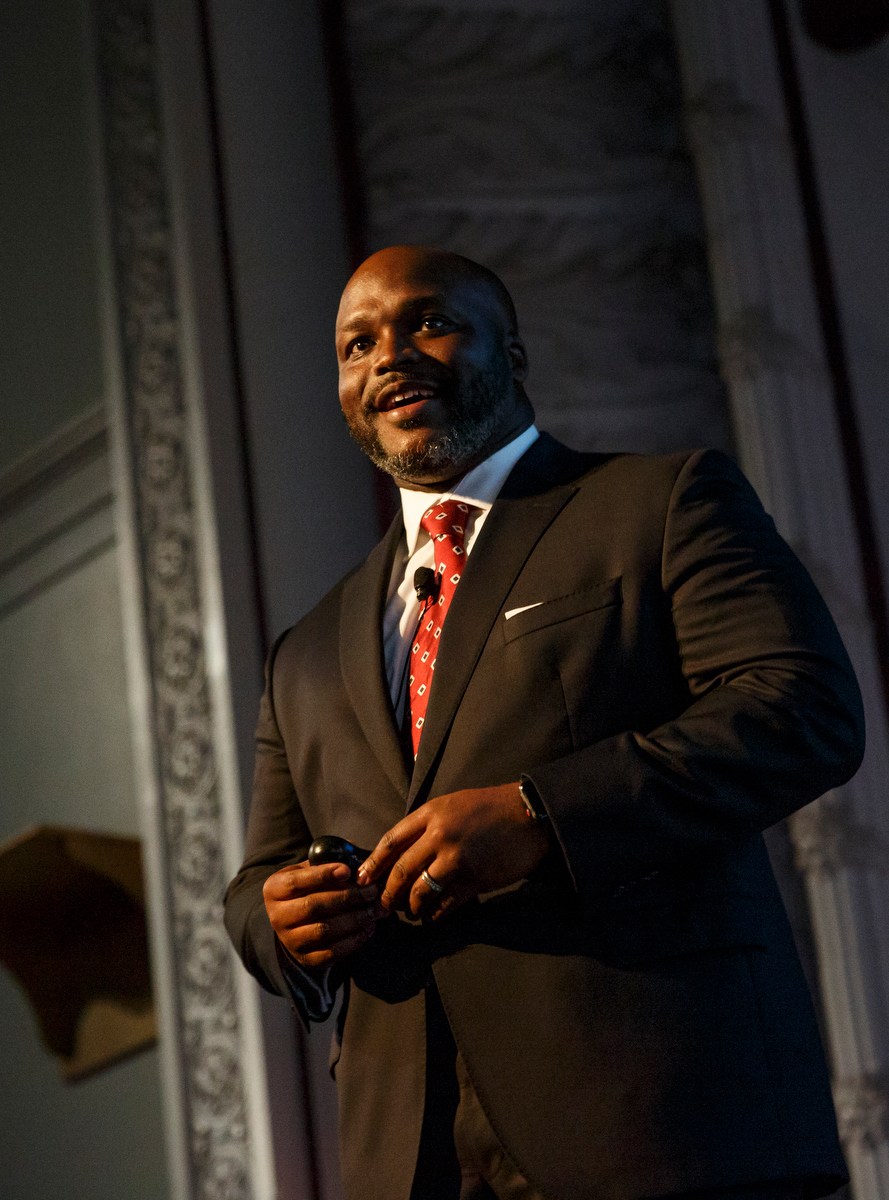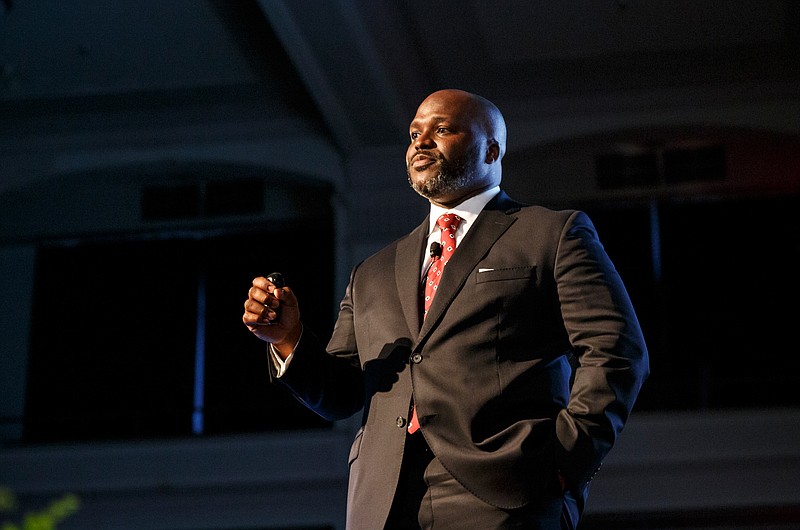 Staff photo by Doug Strickland / Hamilton County Schools Superintendent Bryan Johnson gives a "State of the System" address at Chattanooga School for the Arts and Sciences on Thursday, Feb. 7, 2019, in Chattanooga, Tenn. Johnson shared the current state of the school system and his outline for the future in an address to the community.
Staff photo by Doug Strickland / Hamilton County Schools Superintendent Bryan Johnson gives a "State of the System" address at Chattanooga School for the Arts and Sciences on Thursday, Feb. 7, 2019, in Chattanooga, Tenn. Johnson shared the current state of the school system and his outline for the future in an address to the community.Superintendent Bryan Johnson doesn't just have his people reviewing academic strategies and ways to turn around some of Hamilton County's worst-performing schools, he also has them taking a hard look at student behavior and discipline.
This school year, a district improvement team made up of central office administrators and school principals is reviewing and updating the school district's code of acceptable behavior, or code of student conduct.
The team, led by Chief of Operations Ken Bradshaw, has held multiple meetings with more than a dozen school principals and is looking at similar rulebooks in like-sized school districts and even districts out-of-state.
But some parents are worried that there isn't enough opportunity for parent feedback.
In February, the district launched a survey that included questions asking parents to rank the seriousness of offenses such as being late to school, using a cellphone in class or cheating.
Upon seeing the survey, one parent was motivated to speak out at a school board meeting. But other parents, including Cindy Parker, didn't even know it had been launched.
"I think that there's a whole [bad] rap about parents need to be more engaged with their child's education, but there are also parents who struggle to work full time and pay the bills and take care of their children," Parker said. "I'm extra concerned because of our child's special needs, but not every parent has the ability to be that attentive, to be that involved."
Parker, a parent of a student with disabilities in pre-K at Soddy Elementary, said she'd like to see the district help parents be more involved in their child's education. She has insights into and concerns about discipline strategies, especially for students with disabilities, and social-emotional needs of all children in the county, but she isn't always sure how to share them.
Alison Anderson belongs to a Facebook group called "Hamilton County Parents for Evidence-Based Discipline" and felt compelled to speak to the board because she thinks there are a lot of evidence-based practices that the district is now using. She also called some aspects of the current code of acceptable behavior "outdated."
"This administration and board have laid the groundwork to do so much good for Hamilton County Schools - Future Ready, Teach for America, the five-year plan - it all has so much potential to increase achievement, but behavior and discipline problems have the potential to drag down all this well-planned work," Anderson said at the school board's Feb. 21 meeting. "What I and a lot of Hamilton County parents would like to see is for discipline and the school environment to be evaluated and treated with the [same] seriousness as the academic interventions being rolled out."
She hopes an updated code of acceptable behavior will take the whole child into consideration and focus on not establishing a negative relationship between students and school.
"Kids could be punished physically or yelled at or shamed and eventually internalize that they are bad kids, zapping their natural love of learning before they've even made it out of first grade and setting them up for being troublemakers and under-performers for years to come," she said.
Anderson also said there should be larger conversations with parents about how kids are treated in schools.
One of the biggest topics that comes up when discussing student discipline is that of corporal punishment, which is still on the books in Hamilton County. In 2017 during a meeting with the Hamilton County PTA Council, Johnson said he was not "a believer in corporal punishment," but until a new code of acceptable behavior is adopted, it has not been officially ruled out.
Other issues such as students having to walk laps, miss out on activities or the lack of education on strategies for how to deal with or regulate emotions are also parent concerns.
Recently, the school district was one of 25 districts flagged by the Tennessee Department of Education for disproportionately disciplining students with disabilities, especially black students, and Johnson along with other school leaders cited an updated code of acceptable behavior as a way to address those disparities.
"Districts need a code that is clear," Johnson said in a meeting with the Times Free Press about the state report. "To date, it has been extremely ambiguous. There's been a lot of variability, and what that does is creates the appearance of disparity in the community. We're just trying to create some consistency among our school leaders."
School leaders also noted that the district was exploring a tiered discipline structure and a more streamlined way of ensuring consequences match infractions across the board and are dealt out equitably.
"At the end of the day, when we talk about college and career readiness and students being ready for post-secondary [education], the reality is we want all students to get a job and no matter what job you go to, you're going to have some expectations, so that is what the code of acceptable behavior is," Johnson said.
Contact staff writer Meghan Mangrum at mmangrum@timesfreepress.com or 423-757-6592. Follow her on Twitter @memangrum.
